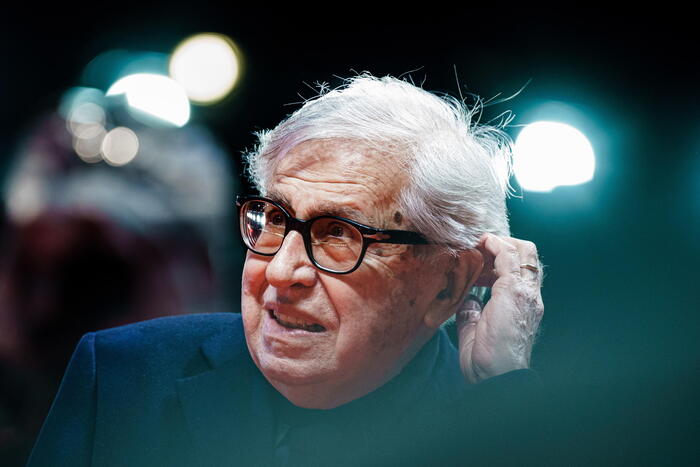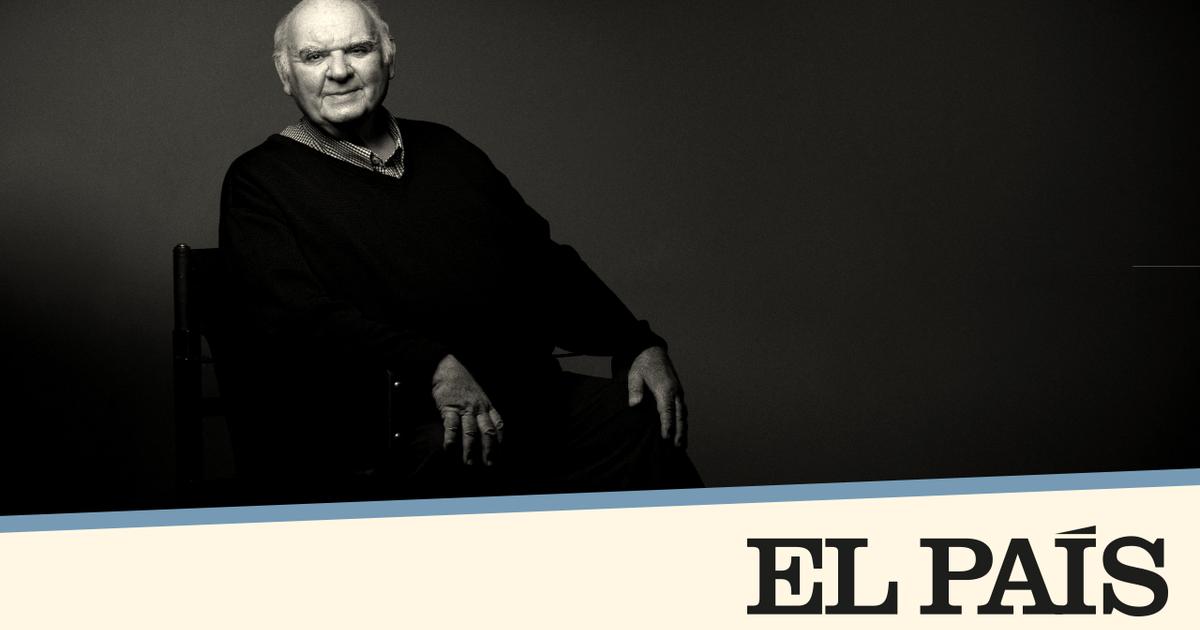The poet and playwright Antonio Gala has died this Sunday at the age of 92 in Cordoba, according to sources close to the family.
At the beginning of 2015, the author had made public that he was free of colon cancer that had been diagnosed four years earlier. It was February 5 and they had just named him adopted son of Malaga. He wore a blue suit and striped tie, a coiffed lion's mane and a broken voice, and he did what he liked best: he mastered the environment, drew the half-smile and, thus tilting the knob of the cane, chewed the words gently and enjoyed listening to them, listening to his own words: "The doctors have declared me free of colon cancer."
Almost four years earlier, on July 6, 2011, Gala (Brazatortas, Ciudad Real, 1936 according to some, 1930 according to others, he never wanted to talk about it) had made a very different announcement in La tronera, the column he was then publishing in the newspaper El Mundo: "I suffer from a cancer that is difficult to remove. And I am subjected, to try to get rid of, a long, which is like a war of which I am the battlefield."
In between, in the summer of 2012, on a suffocating afternoon in El Pimpi in Malaga, between hanging hams and a glass of fino that he did not taste, the writer shared sweat and confessions with this newspaper (Gala did not sweat a drop, the journalist of the newspaper, to seas).
"Chemo heals sometimes, and it always destroys. It takes away the bad, also the good, doesn't it?
"The disease has made me aware of death. I didn't and don't have any fear. You die, and that's fine. I've lasted enough.
Or:
"I have been, much less, very much to really love people. Really. And any misstep in a friendship could do me terrible harm.
"Why do you say that now much less?"
"Because I will die, because I am already very isolated, because I give myself less. Because I dedicate myself to my dogs. I would like them to bury us all together. They have been my absolute company.
Portrait of the novelist Antonio Gala in the eighties. Maria Moreno
From left, Antonio Gala, Alejo Carpentier and Antonio Buero Vallejo, in an audience at the Palacio de la Zarzuela, in 1978.Marisa Flórez
The writer Antonio Gala reads a manifesto against Spain's entry into NATO, at an event in Madrid in March 1986.Luis Magán
Antonio Gala with his dog at his home in Madrid, in 1997. Luis Magán
Antonio Gala portrayed in Madrid, in 1998.Luis Magán
Concha Velasco and Antonio Gala, in the presentation of the play 'Las mañanas del viernes', at the Teatro Apolo in Barcelona in 1999.Silvia T. Colmenero
Antonio Gala, at a book signing at the Madrid Book Fair, in 2001.Santi Burgos
The writer Antonio Gala (left) and the bullfighter Morante de la Puebla talk in Alhaurín el Grande (Málaga), in 2006.Julián Rojas Ocaña
Writers Antonio Gala (left) and José Saramago applaud dancer Matilde Coral at the Guadalajara Book Fair (Mexico) in 2006.EDUARDO ABAD (EFE)
Antonio Gala portrayed in Malaga, in 2012.Julián Rojas
Antonio Gala, at a conference at the Antonio Gala Foundation in Córdoba, in October 2016.PACO PUENTES
Antonio Gala, poet, playwright, novelist, polemicist, columnist, essayist, television scriptwriter... Antonio Gala belonged to everyone and nobody. It means that he reached thousands and thousands of bedside tables and another song was whether he was read or not. Not just anyone, he said it. One afternoon back in 1999, during an interview at his home in Madrid:
—Every time there is a book of yours at the Book Fair it is the best seller or the second best seller...
―... Already, which does not mean that it is the most read, of course. I am one of the best-selling writers in this country, and one of the least read.
Antonio Ángel Custodio Sergio Alejandro María de los Dolores Queen of the Martyrs of the Holy Trinity and All Saints was born in La Mancha, yes, but spent her childhood in Córdoba, the city that, perhaps together with Madrid and Alhaurín el Grande —that Malaga town where the guests of honor to the patron saint festivities are the legionaries and where Antonio Gala had his refuge and that of his dogs, The Baltasara—formed the magic triangle of his life.
He studied and obtained degrees in Law, Philosophy and Letters and Political and Economic Sciences, powerful academic training that the interested party would join to the other, to which it matters, that of intuition, readings, knowledge of classical myths and the factory of own thoughts. That of curiosity without limit, a deep political incorrectness and of the other and a certain humanist eagerness seasoned with unlimited doses of bad slime when he proposed it ("dear, that question of yours is an ordinariness, aren't you ashamed?"), plus some accesses of tenderness that disarmed the most painted ("I'm tired, very tired, but I'm glad to see you, thank you for coming").
He was, in that sense, similar to his friend Terenci Moix, whom he visited in Barcelona four days before he died, knowing that, that the friend was dying despite his laughter and his discouragements.
The mixture of the two formations, the official and the fieldwork, made Gala, among other things, a lover and a specialist of the Arab world. To Gala you threw in the talk the Cordoba of Averroes —but also that of the Jew Maimonides— and a thesis could be extended. He even founded and presided over the Spanish-Arab Friendship Association. And in that capacity he went in 1982 to Baghdad to meet Saddam Hussein. This episode of a meal with the satrap – taken here from an accurate chronicle published by El Periódico de Aragón in 2003 – would serve as a metaphor for the character (of Gala, although well thought out probably also of Saddam). "He was a tyrant, but he was the tyrant of the United States, who had given him the weapons of mass destruction they now seek, to use against Iran ... I called him Manolo, because of his appearance between bricklayer and truck driver, with those black eyes and that mustache, which looked like Chamberí. And while I read my verses, he gave a shout: 'Wow!', and I was scared: he gasses me. And the interpreter said that was the equivalent of 'Olé!' (which comes from Allah), and it was like saying, 'God bless you.'
No waste.
But let's get serious. Gala, who knew what it is to be precocious, wrote about thirty plays after winning in 1963 with the first of them, Los verdes campos del Edén, the Calderón de la Barca National Theater Award. Then they would come, among many others, Anillos para una dama (1973, later adapted by himself for TVE, where he also signed the seriesPaisaje con figuras), Las cítaras colgadas de los árboles (1974), ¿Por qué corres, Ulises? (1975), Petra Regalada (1980), Los bellos durmientes (1994) or the libretto he wrote for the opera Cristóbal Colón, premiered at the Liceo in 1989.
Among his poetry —that so sold and so little read by the Spaniards, according to Gala himself— stand out Enemigo íntimo (1960), Testament andaluz (1998) or El poema de Tobías desangelado (2005). And what about his narrative work? Well, it was a truly belated vocation. That until 1990 he did not publish the novel The Crimson Manuscript, but that with it he won the Planeta Prize. That with The Turkish Passion (1993) and Beyond the Garden (1995) he achieved success – and controversy, especially on the occasion of the film version that Vicente Aranda made of the first of them, and that got on Gala's nerves. That the world of the novel is facing a work as effective in its sales capacity as very limited in the literary.
In the Transition and in the following years it was a democratic red of the first hour. He asked for autonomy for Andalusia. He chaired the No to NATO platform. He created in Córdoba the Antonio Gala Foundation to help young creators and collaborated in media such as EL PAÍS Semanal (where he published his famous Talks with Troylo) and the newspaper El Mundo, where he signed his column La tronera every day, making his readers enjoy and exasperate them equally and putting on the verge of anxiety crisis the editorial secretaries who typed his texts, accustomed to the mixture of finesse and invective brand of the house.
Ironic, quarrelsome, cultured, funny and witty, snobbish as the most, incendiary in his articles, a somewhat impostor, unconfessed classist and extremely lovable when he left, Antonio Gala leaves the world he had to live and goes to the green fields of Eden. Or where the hell the camps are.

/cloudfront-eu-central-1.images.arcpublishing.com/prisa/AQRPLJQ6MZBI5M3IQSBXPNEZUI.JPG)







/cloudfront-eu-central-1.images.arcpublishing.com/prisa/TOX46SN7LVG6VITCFU2H3LUHYE.jpg)